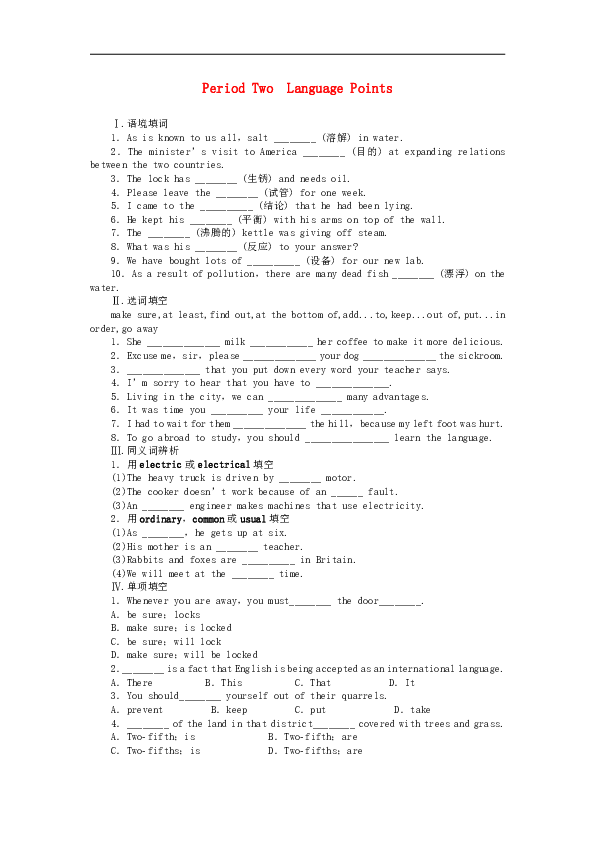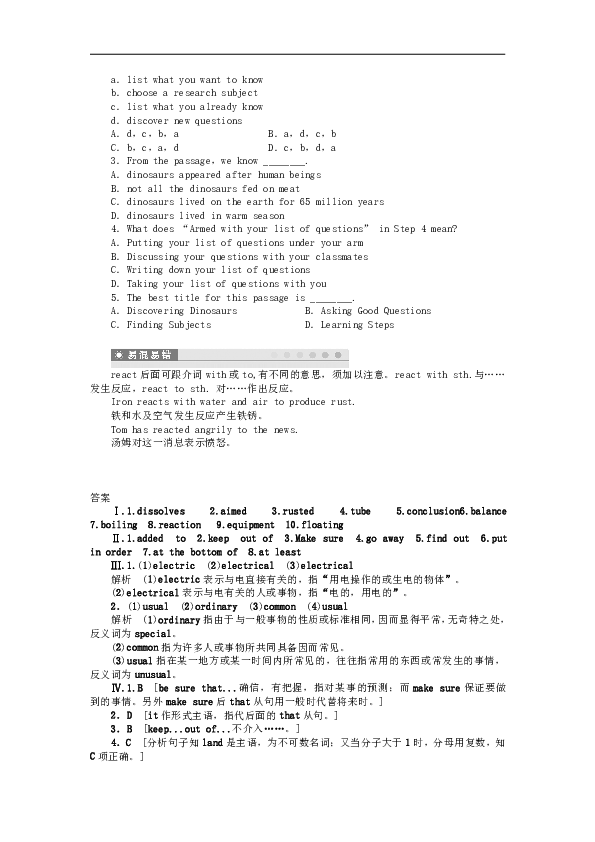外研版高中英语必修1课时作业: Module5 A Lesson in a Lab Period Two Language Points
文档属性
| 名称 | 外研版高中英语必修1课时作业: Module5 A Lesson in a Lab Period Two Language Points |  | |
| 格式 | zip | ||
| 文件大小 | 61.6KB | ||
| 资源类型 | 教案 | ||
| 版本资源 | 外研版 | ||
| 科目 | 英语 | ||
| 更新时间 | 2020-02-28 22:22:32 | ||
图片预览



文档简介
Period Two Language Points
Ⅰ.语境填词
1.As is known to us all,salt ________ (溶解) in water.
2.The minister’s visit to America ________ (目的) at expanding relations between the two countries.
3.The lock has ________ (生锈) and needs oil.
4.Please leave the ________ (试管) for one week.
5.I came to the __________ (结论) that he had been lying.
6.He kept his ________ (平衡) with his arms on top of the wall.
7.The ________ (沸腾的) kettle was giving off steam.
8.What was his ________ (反应) to your answer?
9.We have bought lots of __________ (设备) for our new lab.
10.As a result of pollution,there are many dead fish ________ (漂浮) on the water.
Ⅱ.选词填空
make sure,at least,find out,at the bottom of,add...to,keep...out of,put...in order,go away
1.She ______________ milk ____________ her coffee to make it more delicious.
2.Excuse me,sir,please ______________ your dog ______________ the sickroom.
3.______________ that you put down every word your teacher says.
4.I’m sorry to hear that you have to ______________.
5.Living in the city,we can ______________ many advantages.
6.It was time you __________ your life ____________.
7.I had to wait for them ______________ the hill,because my left foot was hurt.
8.To go abroad to study,you should ________________ learn the language.
Ⅲ.同义词辨析
1.用electric或electrical填空
(1)The heavy truck is driven by ________ motor.
(2)The cooker doesn’t work because of an ______ fault.
(3)An ________ engineer makes machines that use electricity.
2.用ordinary,common或usual填空
(1)As ________,he gets up at six.
(2)His mother is an ________ teacher.
(3)Rabbits and foxes are __________ in Britain.
(4)We will meet at the ________ time.
Ⅳ.单项填空
1.Whenever you are away,you must________ the door________.
A.be sure;locks
B.make sure;is locked
C.be sure;will lock
D.make sure;will be locked
2.________ is a fact that English is being accepted as an international language.
A.There B.This C.That D.It
3.You should________ yourself out of their quarrels.
A.prevent B.keep C.put D.take
4.________ of the land in that district________ covered with trees and grass.
A.Two-fifth;is B.Two-fifth;are
C.Two-fifths;is D.Two-fifths;are
5.We have________ the conclusion that he is honest.Which is wrong?
A.reached B.drawn C.arrived at D.come
6.We must________ the truth of the matter.
A.find out B.look for
C.find D.discover
7.I________ building another factory to produce more products.
A.will think of B.am thinking of
C.shall think of D.have thought of
8.His study is in great disorder,so his housekeeper has given up trying to put his books________.
A.in order B.in need
C.in turn D.in the place
9.—Did you see the new movie directed by that famous director?It’s said to be________ great fun.
—No,I have been busy repairing all the broken office________ these days.
A.a;equipment B.the;equipments
C./;equipment D./;equipments
10.For a moment nothing happened.Then ________ all shouting together.
A.voices had come B.came voices
C.voices would come D.did voices come
Ⅴ.阅读理解
When you’re curious_about something,and want to know more about it,you can use the way of asking questions.Asking questions is the first step to make discoveries and find interesting answers.The steps below can guide you during the research (研究).
Step 1:On a notecard or piece of paper,write down the subject that you are interested in.Just get the main idea down.For example,you might write:Discover more about dinosaurs.
Step 2:Next,stop and think for a moment about what you already know about your subject.List what you already know like the sentences below:
(1)Dinosaurs lived long before human beings appeared.
(2)Dinosaurs lived on the earth for more than 150 million years.
(3)Some dinosaurs fed on (吃) plants,some on meat.
Step 3:What can you do with what you want to learn?By asking questions.On your paper,start writing down questions about the dinosaurs as you think of them:
(1)What’s the best weather for dinosaurs to live in?
(2)How many kinds of dinosaurs are there?
(3)Have dinosaurs really disappeared?
Step 4:Armed_with_your_list_of_questions,you can now go to the nearest library or computer to begin your research.As you learn more about your subject,you’ll probably discover some new questions.For example,you might discover that dinosaurs disappeared about 65 million years ago.Why?What happened?Asking new questions can help you research your subject more widely.
If you always find something interesting to research,take time to organize (组织) your thinking by asking good questions.And remember learning more always brings more questions.
1.The underlined phrase “curious about” in the first paragraph means “________”.
A.worried about B.bored with
C.eager to learn about D.ready to do
2.When you do some research,you should take the following steps:
a.list what you want to know
b.choose a research subject
c.list what you already know
d.discover new questions
A.d,c,b,a B.a,d,c,b
C.b,c,a,d D.c,b,d,a
3.From the passage,we know ________.
A.dinosaurs appeared after human beings
B.not all the dinosaurs fed on meat
C.dinosaurs lived on the earth for 65 million years
D.dinosaurs lived in warm season
4.What does “Armed with your list of questions” in Step 4 mean?
A.Putting your list of questions under your arm
B.Discussing your questions with your classmates
C.Writing down your list of questions
D.Taking your list of questions with you
5.The best title for this passage is ________.
A.Discovering Dinosaurs B.Asking Good Questions
C.Finding Subjects D.Learning Steps
react后面可跟介词with或to,有不同的意思,须加以注意。react with sth.与……发生反应,react to sth. 对……作出反应。?
Iron reacts with water and air to produce rust.?
铁和水及空气发生反应产生铁锈。?
Tom has reacted angrily to the news.?
汤姆对这一消息表示愤怒。
答案
Ⅰ.1.dissolves 2.aimed 3.rusted 4.tube 5.conclusion6.balance 7.boiling 8.reaction 9.equipment 10.floating
Ⅱ.1.added to 2.keep out of 3.Make sure 4.go away 5.find out 6.put in order 7.at the bottom of 8.at least
Ⅲ.1.(1)electric (2)electrical (3)electrical
解析 (1)electric表示与电直接有关的,指“用电操作的或生电的物体”。
(2)electrical表示与电有关的人或事物,指“电的,用电的”。
2.(1)usual (2)ordinary (3)common (4)usual
解析 (1)ordinary指由于与一般事物的性质或标准相同,因而显得平常,无奇特之处,反义词为special。
(2)common指为许多人或事物所共同具备因而常见。
(3)usual指在某一地方或某一时间内所常见的,往往指常用的东西或常发生的事情,反义词为unusual。
Ⅳ.1.B [be sure that...确信,有把握,指对某事的预测;而make sure保证要做到的事情。另外make sure后that从句用一般时代替将来时。]
2.D [it作形式主语,指代后面的that从句。]
3.B [keep...out of...不介入……。]
4.C [分析句子知land是主语,为不可数名词;又当分子大于1时,分母用复数,知C项正确。]
5.D [come变为come to就正确了。]
6.A [find out指过程或动作,符合题意。look for指寻找;find指结果;discover指发现已存在而不为所知的事情,多指科学方面的发现。]
7.B [句意为:我正在考虑建另一个工厂来生产更多的产品。“正在考虑”应用进行时。]
8.A [考查不同短语在语境中的应用。句意为:他的书房太乱了,所以管家已放弃了尝试把他的书按顺序排列。in order与in disorder互为反义,符合句意。in need需要;in turn依次;in the place在某个地方。若D项in the place去掉定冠词the,则也为正确答案。]
9.C [fun为不可数名词,前不与冠词连用;equipment为不可数名词,没有复数。]
10.B [副词then位于句首,且谓语动词是come的某种形式,故句子完全倒装。]
Ⅴ.1.C [词义猜测题。由语境“want to know more about it”以及“asking questions”可推测curious about意为“对……好奇(而急于去了解)”。]
2.C [细节理解题。综合短文的四个步骤,可以看出首先要选择一个研究课题,只有C项第一个步骤是此步骤。]
3.B [细节理解题。由Step 2中的第(3)条“Some dinosaurs fed on plants,some on meat.”可知,并不是所有的恐龙都以肉为主食,有些还吃植物。]
4.D [细节理解题。由Step 4第一句中的“...you can now go to the nearest library or computer to begin your research”可知,是去图书馆或者上网开始你的研究课题,因此应该是带着你的问题。]
5.B [主旨大意题。由最后一段主题段归纳得知。最后一段主要阐述学的多问题就多,应该拿出时间来思考一些高水平的问题。]
Ⅰ.语境填词
1.As is known to us all,salt ________ (溶解) in water.
2.The minister’s visit to America ________ (目的) at expanding relations between the two countries.
3.The lock has ________ (生锈) and needs oil.
4.Please leave the ________ (试管) for one week.
5.I came to the __________ (结论) that he had been lying.
6.He kept his ________ (平衡) with his arms on top of the wall.
7.The ________ (沸腾的) kettle was giving off steam.
8.What was his ________ (反应) to your answer?
9.We have bought lots of __________ (设备) for our new lab.
10.As a result of pollution,there are many dead fish ________ (漂浮) on the water.
Ⅱ.选词填空
make sure,at least,find out,at the bottom of,add...to,keep...out of,put...in order,go away
1.She ______________ milk ____________ her coffee to make it more delicious.
2.Excuse me,sir,please ______________ your dog ______________ the sickroom.
3.______________ that you put down every word your teacher says.
4.I’m sorry to hear that you have to ______________.
5.Living in the city,we can ______________ many advantages.
6.It was time you __________ your life ____________.
7.I had to wait for them ______________ the hill,because my left foot was hurt.
8.To go abroad to study,you should ________________ learn the language.
Ⅲ.同义词辨析
1.用electric或electrical填空
(1)The heavy truck is driven by ________ motor.
(2)The cooker doesn’t work because of an ______ fault.
(3)An ________ engineer makes machines that use electricity.
2.用ordinary,common或usual填空
(1)As ________,he gets up at six.
(2)His mother is an ________ teacher.
(3)Rabbits and foxes are __________ in Britain.
(4)We will meet at the ________ time.
Ⅳ.单项填空
1.Whenever you are away,you must________ the door________.
A.be sure;locks
B.make sure;is locked
C.be sure;will lock
D.make sure;will be locked
2.________ is a fact that English is being accepted as an international language.
A.There B.This C.That D.It
3.You should________ yourself out of their quarrels.
A.prevent B.keep C.put D.take
4.________ of the land in that district________ covered with trees and grass.
A.Two-fifth;is B.Two-fifth;are
C.Two-fifths;is D.Two-fifths;are
5.We have________ the conclusion that he is honest.Which is wrong?
A.reached B.drawn C.arrived at D.come
6.We must________ the truth of the matter.
A.find out B.look for
C.find D.discover
7.I________ building another factory to produce more products.
A.will think of B.am thinking of
C.shall think of D.have thought of
8.His study is in great disorder,so his housekeeper has given up trying to put his books________.
A.in order B.in need
C.in turn D.in the place
9.—Did you see the new movie directed by that famous director?It’s said to be________ great fun.
—No,I have been busy repairing all the broken office________ these days.
A.a;equipment B.the;equipments
C./;equipment D./;equipments
10.For a moment nothing happened.Then ________ all shouting together.
A.voices had come B.came voices
C.voices would come D.did voices come
Ⅴ.阅读理解
When you’re curious_about something,and want to know more about it,you can use the way of asking questions.Asking questions is the first step to make discoveries and find interesting answers.The steps below can guide you during the research (研究).
Step 1:On a notecard or piece of paper,write down the subject that you are interested in.Just get the main idea down.For example,you might write:Discover more about dinosaurs.
Step 2:Next,stop and think for a moment about what you already know about your subject.List what you already know like the sentences below:
(1)Dinosaurs lived long before human beings appeared.
(2)Dinosaurs lived on the earth for more than 150 million years.
(3)Some dinosaurs fed on (吃) plants,some on meat.
Step 3:What can you do with what you want to learn?By asking questions.On your paper,start writing down questions about the dinosaurs as you think of them:
(1)What’s the best weather for dinosaurs to live in?
(2)How many kinds of dinosaurs are there?
(3)Have dinosaurs really disappeared?
Step 4:Armed_with_your_list_of_questions,you can now go to the nearest library or computer to begin your research.As you learn more about your subject,you’ll probably discover some new questions.For example,you might discover that dinosaurs disappeared about 65 million years ago.Why?What happened?Asking new questions can help you research your subject more widely.
If you always find something interesting to research,take time to organize (组织) your thinking by asking good questions.And remember learning more always brings more questions.
1.The underlined phrase “curious about” in the first paragraph means “________”.
A.worried about B.bored with
C.eager to learn about D.ready to do
2.When you do some research,you should take the following steps:
a.list what you want to know
b.choose a research subject
c.list what you already know
d.discover new questions
A.d,c,b,a B.a,d,c,b
C.b,c,a,d D.c,b,d,a
3.From the passage,we know ________.
A.dinosaurs appeared after human beings
B.not all the dinosaurs fed on meat
C.dinosaurs lived on the earth for 65 million years
D.dinosaurs lived in warm season
4.What does “Armed with your list of questions” in Step 4 mean?
A.Putting your list of questions under your arm
B.Discussing your questions with your classmates
C.Writing down your list of questions
D.Taking your list of questions with you
5.The best title for this passage is ________.
A.Discovering Dinosaurs B.Asking Good Questions
C.Finding Subjects D.Learning Steps
react后面可跟介词with或to,有不同的意思,须加以注意。react with sth.与……发生反应,react to sth. 对……作出反应。?
Iron reacts with water and air to produce rust.?
铁和水及空气发生反应产生铁锈。?
Tom has reacted angrily to the news.?
汤姆对这一消息表示愤怒。
答案
Ⅰ.1.dissolves 2.aimed 3.rusted 4.tube 5.conclusion6.balance 7.boiling 8.reaction 9.equipment 10.floating
Ⅱ.1.added to 2.keep out of 3.Make sure 4.go away 5.find out 6.put in order 7.at the bottom of 8.at least
Ⅲ.1.(1)electric (2)electrical (3)electrical
解析 (1)electric表示与电直接有关的,指“用电操作的或生电的物体”。
(2)electrical表示与电有关的人或事物,指“电的,用电的”。
2.(1)usual (2)ordinary (3)common (4)usual
解析 (1)ordinary指由于与一般事物的性质或标准相同,因而显得平常,无奇特之处,反义词为special。
(2)common指为许多人或事物所共同具备因而常见。
(3)usual指在某一地方或某一时间内所常见的,往往指常用的东西或常发生的事情,反义词为unusual。
Ⅳ.1.B [be sure that...确信,有把握,指对某事的预测;而make sure保证要做到的事情。另外make sure后that从句用一般时代替将来时。]
2.D [it作形式主语,指代后面的that从句。]
3.B [keep...out of...不介入……。]
4.C [分析句子知land是主语,为不可数名词;又当分子大于1时,分母用复数,知C项正确。]
5.D [come变为come to就正确了。]
6.A [find out指过程或动作,符合题意。look for指寻找;find指结果;discover指发现已存在而不为所知的事情,多指科学方面的发现。]
7.B [句意为:我正在考虑建另一个工厂来生产更多的产品。“正在考虑”应用进行时。]
8.A [考查不同短语在语境中的应用。句意为:他的书房太乱了,所以管家已放弃了尝试把他的书按顺序排列。in order与in disorder互为反义,符合句意。in need需要;in turn依次;in the place在某个地方。若D项in the place去掉定冠词the,则也为正确答案。]
9.C [fun为不可数名词,前不与冠词连用;equipment为不可数名词,没有复数。]
10.B [副词then位于句首,且谓语动词是come的某种形式,故句子完全倒装。]
Ⅴ.1.C [词义猜测题。由语境“want to know more about it”以及“asking questions”可推测curious about意为“对……好奇(而急于去了解)”。]
2.C [细节理解题。综合短文的四个步骤,可以看出首先要选择一个研究课题,只有C项第一个步骤是此步骤。]
3.B [细节理解题。由Step 2中的第(3)条“Some dinosaurs fed on plants,some on meat.”可知,并不是所有的恐龙都以肉为主食,有些还吃植物。]
4.D [细节理解题。由Step 4第一句中的“...you can now go to the nearest library or computer to begin your research”可知,是去图书馆或者上网开始你的研究课题,因此应该是带着你的问题。]
5.B [主旨大意题。由最后一段主题段归纳得知。最后一段主要阐述学的多问题就多,应该拿出时间来思考一些高水平的问题。]
